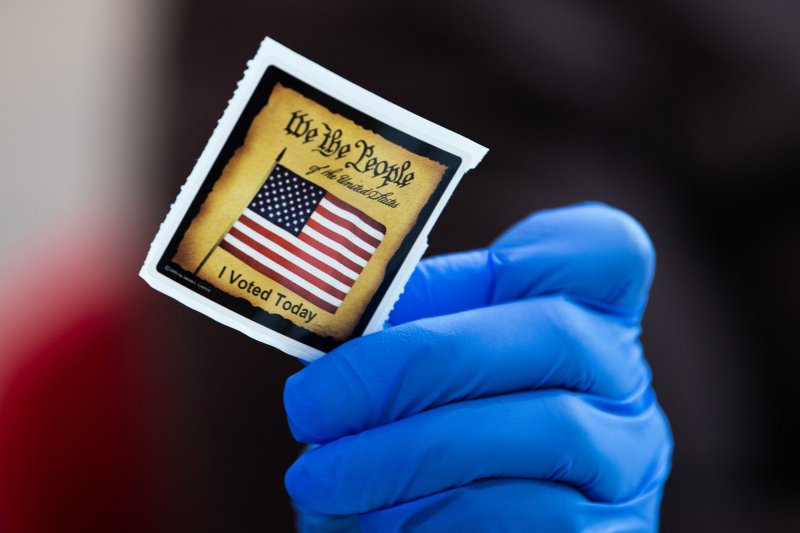New Jersey and Delaware had originally planned to hold their nominating contests in June, but they were delayed by the coronavirus pandemic. File Photo by Kevin Dietsch/UPI |
License Photo
July 7 (UPI) -- Joe Biden won primary elections in both New Jersey and Delaware in votes held amid expected glitches and delays caused by quick maneuvers to send out mail-in ballots due to the coronavirus pandemic.
Biden won 85.9 percent of the vote in New Jersey while Sen. Bernie Sanders of Vermont received 12.6 percent of the vote. In Delaware, which Biden represented in the U.S. Senate from 1973 to 2009, the former vice president won 90.3 percent of the vote, Sanders received 6.6 percent and Massachusetts Sen. Elizabeth Warren received 3.1 percent.
Having already secured the delegates necessary to clinch the nomination, Biden is the presumptive pick to represent the Democratic Party in the presidential election and challenge President Donald Trump. Sanders dropped out of the race in April but has remained on the ballot to continue to collect delegates.
The bulk of the voting in both states will be mainly conducted via mail ballots in an effort to reduce COVID-19 transmission risks of in-person voting. Election officials in New Jersey said they expected troubles similar to the ones they saw in May when local elections were held entirely by mail.
New Jersey
The state's quick move to a mail ballot primary posed challenges for a new voter registration system and state workers have struggled to cope with the large volume of ballots, resulting in delays and ballots or applications being sent to people who have died, officials said.
Every registered Republican and Democrat in the state was sent a ballot for Tuesday's primary, which was originally scheduled for June 2 before it was postponed. Only about half of the state's in-person polling places were open, mostly to accommodate voters with physical disabilities.
Amy Kennedy won a race among Democrats in the state's 2nd District for the opportunity to challenge Rep. Jeff Van Drew in November. Van Drew was elected two years ago as a Democrat but later switched to the Republican Party.
Van Drew's 2018 election in the district that includes Atlantic City flipped the seat to the Democrats as part of that year's "Blue Wave," and his five Democratic challengers are eager to regain it.
In the 3rd District, Republican Kate Gibbs emerged victorious from a bitter fight with David Richter for the nomination to challenge freshman Democratic Rep. Andy Kim.
Sen. Cory Booker, a former 2020 Democratic presidential candidate, was able to fend off opposition in the Democratic primary from progressive activist Lawrence Hamm, winning 88.8 percent of the vote to Hamm's 11.
Huntsman loses
Twice-elected former Utah Gov. Jon Huntsman Jr. will not win back his old job in November.
Republican gubernatorial candidate and Lt. Gov. Spencer Cox will be the GOP nominee in the general election after Huntsman conceded the primary race on Monday night.
Cox and Huntsman were locked in a close race in Utah's Republican primary. Monday, the race was called in Cox's favor and Huntsman decided to make the concession.
The result was a surprise to many, who expected the former Utah governor to win the GOP primary and the election in November. Huntsman won election in 2004 and 2008, but did not finish his second term -- instead, opting to accept an appointment as President Barack Obama's ambassador to China.
Monday's victory gives Cox front-runner status to succeed Gov. Gary Herbert, as no Democrat has been elected Utah governor in decades. Cox will face Democratic nominee and University of Utah law professor Chris Peterson in the general election.















